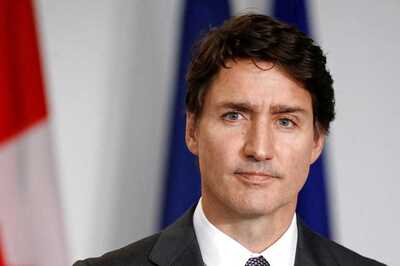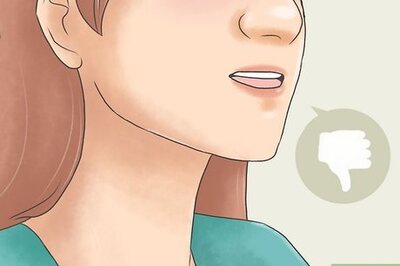
views
Who is Papa Legba?
Papa Legba is a Haitian Vodou spirit associated with crossroads. In the Haitian Vodou religion and belief system, Papa Legba is a loa (Haitian spirit/god) who serves as the gatekeeper between the human and spirit worlds. He stands at a spiritual crossroads to grant or deny people’s permission to speak with the spirits. While he is mostly associated with Haitian Vodou, he originated as part of West African Vodun. In Haiti, Papa Legba also serves as the great elocutioner and facilitates communication, speech, and understanding. He is believed to speak all languages of the world. Because many African practices blended with Catholicism, Papa Legba is also associated with saints like St. Peter, St. Anthony, and St. Lazarus.
Papa Legba often appears as an old man. Papa Legba is typically depicted as an old man with a cane or crutches. He often dresses in rags and a broad-brimmed hat and appears smoking a pipe or drinking rum. Because of his grandpa-like image, he is often the favorite loa of children and is often tasked with babysitting while adults perform serious rituals. Symbols: keys, a cane, the colors red and black, dogs, and his veve (a geometric drawing used to represent the loa) Offerings: candy, rum, tobacco Associations: Crossroads, gates, doors
Papa Legba Origins & History
Papa Legba likely originated in the kingdom of Dahomey. The practice of Vodun likely began in the kingdom of Dahomey, or modern-day Benin, in West Africa. When the people of Africa were enslaved and taken to America, they brought many of their gods, spirits, and religious practices with them, including Papa Legba. In Africa, Papa Legba was sometimes viewed as a fertility god or a trickster god. He could appear as male or female. In some areas, he served as a protector of children or a healer.
Haitian Vodou emerged as different African religions mixed. Haitian Vodou was created sometime between the 16th and 19th centuries, as enslaved peoples found commonalities between their spiritual beliefs and practices. They also incorporated beliefs from Catholicism, with Bondye, the supreme Haitian creator, being compared to the Christian god and the loa being compared to Christian saints. Versions of Papa Legba also exist in places like Brazil, Trinidad, and Cuba. Haitian Vodou practices also evolved into New Orleans voodoo.
Papa Legba’s Role in Vodou
Papa Legba is the great communicator in Haitian Vodou. According to Vodou beliefs, Papa Legba speaks all the languages in the world, as well as the language of the spirits. He is the mediator who opens the door to allow spirits into the human world. Because of this, many Vodou ceremonies begin with an offering to Papa Legba so that he will keep the door open and allow practitioners to communicate with the spirits.
Papa Legba is generally a benevolent spirit. While he has sometimes been depicted as evil in pop culture, in Vodou, Papa Legba is often viewed as a fatherly figure who is not very demanding. However, like all loa, he can show a negative side if he isn’t treated with respect, so practitioners believe it is essential to show proper reverence so that he will keep the gates to the spirit world open. He is also sometimes depicted as a trickster who is fond of riddles. He deals with uncertainty and confusion, and sometimes his messages can be distorted and misunderstood.
How to Summon Papa Legba
Get initiated into Vodou. Haitian Vodou is considered a closed religion that requires initiation. If you are not already a Vodou practitioner, consult with a houngan or mambo to learn how to join the practice. Then, you will work under their tutelage to participate in ceremonies and rituals to develop a relationship with Papa Legba and the other loa.
Provide an offering. To show proper respect to Papa Legba, most Vodou practitioners provide him an offering before summoning him or beginning a ceremony. Some common offerings include candy, tobacco, or rum, as well as coffee or plantains. Another way of showing respect is simply lighting a candle, acknowledging him, and asking him for help. People often summon Papa Legba when they feel stuck at a crossroads and need help moving forward. There is some debate about which day is best to pay homage to Papa Legba. Some say Monday, while others believe it is Tuesday or Wednesday. Papa Legba may prefer different days depending on what he has told the family worshipping him.
Recite a chant to summon Papa Legba. Once you’ve given Papa Legba your offering, chant something like “Papa Legba, open the gate for me/Atibon Legba, open the gate for me/Open the gate for me/Papa that I may pass/When I return I will thank the loa.” There are several variations that will work as long as you’re respectful.
Papa Legba in Pop Culture
Papa Legba is often recognized for his character in American Horror Story. While Papa Legba has made many appearances in modern pop culture, he is perhaps most well-known for appearing in “Coven,” the third season of American Horror Story. However, his depiction was very inaccurate, as he was given a frightening appearance and more closely resembled Bawon Samdi, another Vodou spirit who serves as master of the dead. In American Horror Story, Papa Legba was depicted with glowing red eyes and a top hat decorated with skulls. In addition to AHS, Papa Legba has been featured or referenced in several 20th-century blues songs, like Robert Johnson’s “Me and the Devil Blues,” as well as books like Neil Gaiman’s American Gods and Terry Pratchett’s Witches Abroad. He is even included in an episode of Miami Vice.



















Comments
0 comment